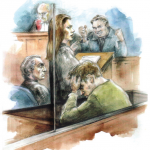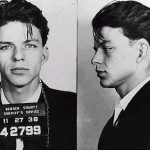Ukrainian interrogations through a Canadian lens
A woman sits wearing a parka in an empty room. She watches something—concerned, struck, peering through the gaps between strands of her wet, exhausted curls. Her long eyes are glossy and her lips are parted with a quiver.
A young man, hands clasped with every ounce of energy, hope, and desperation, sits; his eyes are almost shut, his turtleneck sweater blends with the eerily homey-looking wallpaper. There is something Slavic or Russian written across his forehead in black ink.
An arm stretches from the right top corner frame of another photo, wearing a black shirt with white pinstripes. It is holding a gun. The gun is pointed at the side of a bald man’s head, his face a dense pink. It would fade into the wallpaper, were it not for his dark, fixated eyes. His brow is worried, his lips pursed, his arms tucked into his black leather jacket, hiding.
“Interrogations,” Donald Weber’s series of 12 photographs capturing moments in Ukrainian post-Soviet authority interrogation rooms, has won the Canadian photographer the top prize in the Portraits-Stories category at the 2012 World Press Photo contest.
“I search to do meaningful work that says something, and sometimes you can lose focus of where you are and who you are. But my work can only really be created through a process of being there, and feeling and understanding in the situation I find myself in. I do not preplan.”
In the Twitter age we live and work in, that’s something we should all consider—the role our experience has in how we tell a story. In so many cases of travel writing, photography, and documentary, the responsibility of story-telling is handed over to the everyman; we’re seeing firsthand accounts more than ever. The Spanish radio program Radio Ambulante tells firsthand stories of what’s happening in Latin America, in their original language, accents, and slang—emotion and all. It seeks to give a voice to Spanish speakers from all over the world, similar to North American broadcasts like This American Life.
“Interrogations” is an example of how our experiences as journalists—as people—bleed into how we tell a story, and how we tell it well. On the series, Weber says, “What I really wanted to do was to have a monotony of faces, a barrage of moments that are viewed intimately but speak to a larger and more powerful subject.”
That must be what sets our stories apart from the everyday: how they relate to everything else.
Lead images via Donald Weber. To view more from the “Interrogations” gallery or any of the other World Press Photo winners, visit: www.worldpressphoto.org














